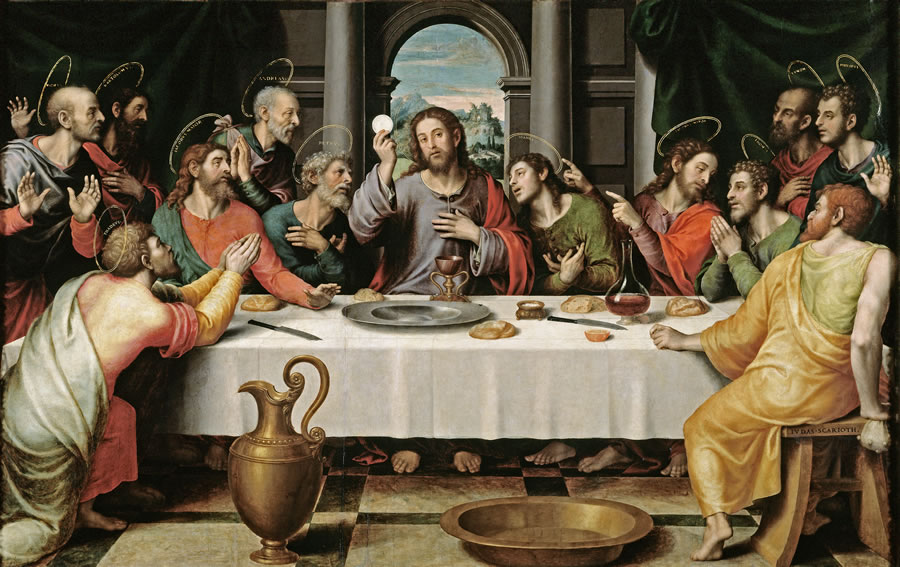
The Solemnity of Corpus Christi
by Fr. Tony Okolo C.S.Sp., V.F. | 06/22/2025 | Weekly ReflectionBeloved Parishioners,
Christ solemnly declares in John 6:51–52: “I am the living bread that came down from heaven; whoever eats this bread will live forever; and the bread that I will give is my flesh for the life of the world.” By these words, Jesus reveals that no one can attain salvation—of both soul and body—without uniting themselves with His Body and Blood. To ensure that this saving gift would remain eternally present to His Church, Jesus instituted the Eucharist at the Last Supper.
He took bread, gave thanks, broke it, and gave it to His disciples, saying: “This is my Body, which is given for you; do this in remembrance of me.” Likewise, He took the chalice and said “This cup is the new covenant in my Blood. Do this, as often as you drink it, in remembrance of me.” (1 Cor 11:24–25) With these words, Christ instituted the Holy Eucharist as both sacrament and sacrifice, entrusting the Church with the living memorial of His Passion, Death, and Resurrection.
The Church teaches therefore that “the Eucharist is the true Body and Blood of Jesus Christ, together with His soul and divinity, under the appearances of bread and wine.” (CCC 1322) It is the very sacrifice of Christ on the Cross perpetuated throughout the ages until His return in glory (CCC 1323). During every Mass, the Eucharist makes present the one sacrifice of Calvary in an unbloody manner. This sacred mystery is not a mere symbolic recollection but the real, sacramental presence of Christ’s self offering, presented to the Father and shared with the faithful (CCC 1362–1367).
This Sunday, the Church celebrates the Solemnity of Corpus Christi — the Most Holy Body and Blood of Christ. This liturgical feast honors the real presence of Jesus Christ in the Eucharist. It originated in the 13th century through the visions of St. Juliana of Mont Cornillon, a Belgian nun who saw the Church in a vision as a full moon with a dark spot, symbolizing the lack of a feast dedicated solely to the Eucharist.
Bishop Robert de Torote of Liège supported the devotion, and the feast was first celebrated in his diocese in 1246. Later, Pope Urban IV extended it to the universal Church in 1264, following the Eucharistic Miracle of Bolsena, where a doubting priest witnessed blood flowing from a consecrated host during Mass. The Pope then commissioned St. Thomas Aquinas to compose the liturgical texts and hymns for the feast, including the beloved Pange Lingua and Tantum Ergo.
Corpus Christi is traditionally celebrated on the Thursday after Trinity Sunday, or, in many places, on the following Sunday to allow greater participation. One of the most visible expressions of this celebration is the Eucharistic procession, during which the Blessed Sacrament is carried in a monstrance and honored with reverence and joy. Through this public act, the Church professes her belief in the real presence of Christ, fulfilling His words in Matthew 10:32: “Everyone who acknowledges me before others, I will acknowledge before my heavenly Father.” This same spirit of reverence animates Eucharistic adoration, a devotional practice of prayerful worship before the exposed Blessed Sacrament. In adoring Christ outside of Mass, we deepen our relationship with Him, allowing our love for Him to grow in silence and stillness.
As Pope Benedict XVI once taught, the Eucharist is the Church’s greatest act of adoration, and Eucharistic adoration prolongs and intensifies the grace received during the Mass. Spending time with Jesus in the Blessed Sacrament brings inner peace, healing, clarity, and strength, opening our hearts to the Holy Spirit's guidance and comfort. However, our devotion cannot remain enclosed within the church walls. The same Jesus we adore and receive sends us forth to become what we eat — to be His hands, feet, and heart in the world. The Eucharist calls us to serve Christ in the poor, the lonely, the sick, and the forgotten. As we receive the Body of Christ, we are also sent to build up the Body of Christ in others. St. Paul reminds us: “We, though many, are one body, for we all partake of the one bread.” (1 Cor 10:17) Thus, the Eucharist unites us to Christ and to one another, forming us into a communion of love and service. As Pope Benedict XVI declared, “The Church draws her life from the Eucharist.” Without it, the Church would lose her identity. With it, she becomes the living presence of Christ in the world.
BACK TO LIST